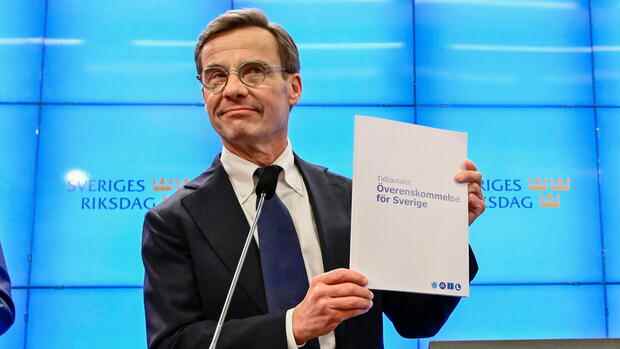Minority governments are not uncommon in Scandinavia – what is new, however, is that such a constellation in Sweden will count on the support of right-wing populists.
(Photo: IMAGO/TT)
Stockholm Around a month after the parliamentary elections, Sweden is facing a clear shift to the right: the leader of the conservative Moderaterna party, Ulf Kristersson, presented his new government on Friday. His party forms a coalition with the Christian Democrats and the Liberals.
The right-wing populist Sweden Democrats are not part of the government, but they are involved in government work for the first time since they entered parliament in 2010. Kristersson’s three-party government relies on the support of the far-right party as his coalition does not have a majority of its own.
“We’re getting significant political influence,” said Sweden Democrat leader Jimmie Åkesson. His party will send political officials to the government chancellery. Nevertheless, he made no secret of the fact that he would have liked to see his party participate in the government. The Sweden Democrats came in second behind the Social Democrats in September’s elections.
Ulf Kristersson is expected to be the new Prime Minister of Sweden. He is standing for election in Parliament on Monday. The four parties that have agreed on government cooperation have a slim majority in the Swedish parliament.
Top jobs of the day
Find the best jobs now and
be notified by email.
Kristersson will then replace the Social Democrat Magdalena Andersson, whose party won by far the most votes in the elections a month ago, but was unable to form a coalition with a majority. Kristersson has not yet published a list of ministers.
Change of course in immigration and energy policies
The participation of the Sweden Democrats, who emerged from the neo-Nazi scene means a clear change of course for Sweden, especially in immigration and energy policy. Under pressure from the Sweden Democrats, Sweden only wants to take in 900 refugees per year instead of the previous 6,400.
The general asylum rules are also to be tightened. In a joint government program, which the Sweden Democrats were also involved in drafting, the parties speak of a “paradigm shift” in relation to asylum policy.
“Sweden should by no means be more generous with regard to the right to asylum than is required by the obligations under EU law or other legally binding international treaties,” says the government program entitled “Agreement for Sweden”, which also provides for budget cuts in development aid.
The new government also wants to introduce a radical change in energy policy. The leader of the Christian Democrats, Ebba Busch, announced a nuclear-friendly policy at a joint press conference.
Jimmie Akesson, leader of the Sweden Democrats, Ulf Kristersson, leader of the Moderate Coalition Party, Ebba Busch, leader of the Christian Democrats and Johan Pehrson, leader of the Liberals
(Photo: dpa)
“New reactors will be built in Sweden,” she said. The new government wants to provide a total of 400 billion crowns (363 million euros) as loan guarantees. It is also to be investigated whether two nuclear power reactors that have already been shut down can be restarted. At the same time, she emphasized that the expansion of wind power should also be promoted.
>> Read here: “Nuclear power? No thanks”: Greens before a difficult party conference
Sweden Democrats gain greater influence for the first time
With the agreement on a joint government program, the Sweden Democrats will have great influence on politics for the first time. So far, all parties have kept the right-wing populists at bay.
According to those involved, the coalition negotiations were very complicated. At first, the Sweden Democrats had strictly rejected the participation of the Liberals in a coalition.
The fact that they have now agreed to this constellation is due to extensive concessions in asylum and immigration policy.
The fact that the new centre-right government does not have its own parliamentary majority has a long tradition in Sweden and the other northern European countries. The voted-out social-democratic government also ruled with changing majorities. What is new in Sweden, however, is that a minority government is relying on the support of a right-wing party.
More: Meloni’s election victory in Italy: The European trend is female, powerful – and right-wing.
